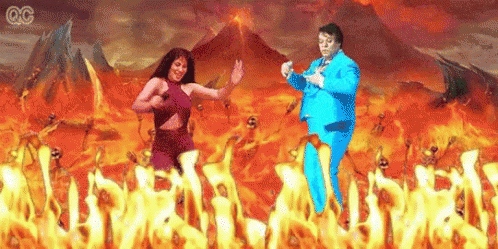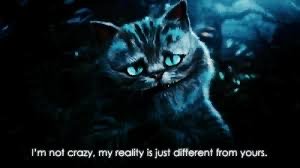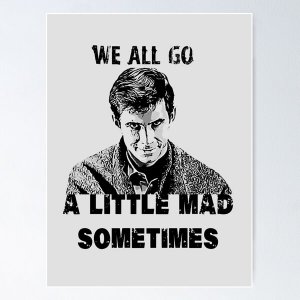He's in his mansion, Gracie Mansion that is; in Carl Shurtz Park.Where's the mayor of Crazy Town?
You are using an out of date browser. It may not display this or other websites correctly.
You should upgrade or use an alternative browser.
You should upgrade or use an alternative browser.
What the Flaming Hell are you doing here?
- Thread starter Bretrick
- Start date
Lewkat
Senior Member
- Location
- New Jersey, USA
Now, what makes you think that I am really here?
Mr. Ed
Be what you is not what you what you ain’t
- Location
- Central NY
What the Flaming Hell are you doing here?
Origins of belief in hell
The Christian belief in hell has developed over the centuries, influenced by both Jewish and Greek ideas of the afterlife.The earliest parts of the Hebrew Bible, around the eighth century B.C., described the afterlife as Sheol, a shadowy, silent pit where the souls of all the dead lingered in a minimal state of silent existence, forever outside of the presence of God. By the sixth century B.C., Sheol was increasingly viewed as a temporary place, where all the departed awaited a bodily resurrection. The righteous would then dwell in the presence of God, and the wicked would suffer in the fiery torment that came to be called “Gehenna,” described as a cursed place of fire and smoke.
Early depictions of the afterlife in ancient Greece, an underworld realm called “Hades,” are similar. There, the listless spirits of the dead lingered in an underground twilight existence, ruled by the god of the dead. Evildoers suffered gloomy imprisonment on an even deeper level called “Tartarus.”
Beginning in the fourth century B.C., after the Greek King Alexander the Great conquered Judea, elements of Greek culture began to influence Jewish religious thought. By time of the first gospels, between 65 and 85 A.D., Jesus refers to the Jewish belief in the eternal fire of Gehenna. Elsewhere, he mentions evildoers’ banishment from the kingdom of God, and the “blazing furnace” where the wicked would suffer sorrow and despair and “where there will be weeping and gnashing of teeth.” Jesus also mentions the Greek Hades when describing how the forces of evil — “the gates of Hades” — would not prevail against the church.
The image that dominated in antiquity eventually prevailed. Hell was where the souls of the damned suffered torturous and unending punishment. Even after the resurrection of the dead at the end of the world, the wicked would be sent back to Hell for eternity.
By the beginning of the fifth century, this doctrine was taught throughout western Christianity. It was reaffirmed officially by popes and councils throughout the Middle Ages.
Medieval theologians continued to stress that the worst of all these torments would be eternal separation from God, the “poena damni.” Medieval visions of the afterlife provided more explicit details: pits full of dark flames, terrible cries, gagging stench, and rivers of boiling water filled with serpents.
Perhaps the most fulsome description of hell was offered by the Italian poet Dante at the beginning of the 14th century in the first section of his “Divine Comedy.” Here the souls of the damned are punished with tortures matching their sins. Gluttons lie in freezing pools of garbage, while murderers thrash in a river of boiling blood.
Christianity, the largest number of followers believe hell is a place of punishment for unbelievers and sinners. Evidently according to the Bible because Adam disobeyed god by eating forbidden fruit, sin came into being bringing pain, sorrow and pestilence.
I prefer not believing in the supernatural or religious beliefs based on faith that cannot be proven by conventional means of identification. Since my un-conversion I see Christianity in a different light that does not include worry or concern regarding physical death. To be blunt, I would have been better off not believing in the first place.
Paco Dennis
SF VIP
- Location
- Mid-Missouri
"What the Flaming Hell are you doing here?"
I have been trying almost everyday to answer this question for a very long time? Actually it is one of my greatest interests. I never can understand the whole "life" thing. What is whole universe about? Why/How is it here? How to I behave appropriately or finding myself in circumstances that I NEVER planned or wanted? Just a lot of curiosity I guess, but it is a BIG question for me.
I have been trying almost everyday to answer this question for a very long time? Actually it is one of my greatest interests. I never can understand the whole "life" thing. What is whole universe about? Why/How is it here? How to I behave appropriately or finding myself in circumstances that I NEVER planned or wanted? Just a lot of curiosity I guess, but it is a BIG question for me.
Last edited:
Bretrick
Well-known Member
- Location
- Perth Western Australia
Wow, thank you for that info. I have never looked into this issue of hell or heaven.What the Flaming Hell are you doing here?
Origins of belief in hell
The Christian belief in hell has developed over the centuries, influenced by both Jewish and Greek ideas of the afterlife.
The earliest parts of the Hebrew Bible, around the eighth century B.C., described the afterlife as Sheol, a shadowy, silent pit where the souls of all the dead lingered in a minimal state of silent existence, forever outside of the presence of God. By the sixth century B.C., Sheol was increasingly viewed as a temporary place, where all the departed awaited a bodily resurrection. The righteous would then dwell in the presence of God, and the wicked would suffer in the fiery torment that came to be called “Gehenna,” described as a cursed place of fire and smoke.
Early depictions of the afterlife in ancient Greece, an underworld realm called “Hades,” are similar. There, the listless spirits of the dead lingered in an underground twilight existence, ruled by the god of the dead. Evildoers suffered gloomy imprisonment on an even deeper level called “Tartarus.”
Beginning in the fourth century B.C., after the Greek King Alexander the Great conquered Judea, elements of Greek culture began to influence Jewish religious thought. By time of the first gospels, between 65 and 85 A.D., Jesus refers to the Jewish belief in the eternal fire of Gehenna. Elsewhere, he mentions evildoers’ banishment from the kingdom of God, and the “blazing furnace” where the wicked would suffer sorrow and despair and “where there will be weeping and gnashing of teeth.” Jesus also mentions the Greek Hades when describing how the forces of evil — “the gates of Hades” — would not prevail against the church.
The image that dominated in antiquity eventually prevailed. Hell was where the souls of the damned suffered torturous and unending punishment. Even after the resurrection of the dead at the end of the world, the wicked would be sent back to Hell for eternity.
By the beginning of the fifth century, this doctrine was taught throughout western Christianity. It was reaffirmed officially by popes and councils throughout the Middle Ages.
Medieval theologians continued to stress that the worst of all these torments would be eternal separation from God, the “poena damni.” Medieval visions of the afterlife provided more explicit details: pits full of dark flames, terrible cries, gagging stench, and rivers of boiling water filled with serpents.
Perhaps the most fulsome description of hell was offered by the Italian poet Dante at the beginning of the 14th century in the first section of his “Divine Comedy.” Here the souls of the damned are punished with tortures matching their sins. Gluttons lie in freezing pools of garbage, while murderers thrash in a river of boiling blood.
Christianity, the largest number of followers believe hell is a place of punishment for unbelievers and sinners. Evidently according to the Bible because Adam disobeyed god by eating forbidden fruit, sin came into being bringing pain, sorrow and pestilence.
I prefer not believing in the supernatural or religious beliefs based on faith that cannot be proven by conventional means of identification. Since my un-conversion I see Christianity in a different light that does not include worry or concern regarding physical death. To be blunt, I would have been better off not believing in the first place.
Bretrick
Well-known Member
- Location
- Perth Western Australia
I think we are just here to exist and to our best to make the most of our time here. Selfish? Some would view it that way but not me. All the critters of the world look after themselves. Doing what they need to survive. Why not us?"What the Flaming Hell are you doing here?"
I have been trying almost everyday to answer this question for a very long time? Actually it is one of my greatest interests. I never can understand the whole "life" thing. What is whole universe about? Why/How is it here? How to I behave appropriately or finding myself in circumstances that I NEVER planned or wanted? Just a lot of curiosity I guess, but it is a BIG question for me.
What the flaming hell am I doing here? - gee wizz - I never realized that I was even in flaming hell - but with these temps it sure feels like it atm? and there are of course a lot of sleezy characters about as well at times and murderous ones and evil ones and hellish ones?? - guess I didn't have a lot of choice about it - but at leasst I am of the caesarian montage - having been born ala caesarian birth - either plucked from the pit of hades - no venice canals for me!!
so back to the original question - yes I could ask you the same thing about both of us - it's flaming hot and why are we here - isn't there supposed to be somewhere cooler up above called heaven?? - dinosaurs - poisonous snakes - active volcanoes - sharks - climate change and you call this fun??
so back to the original question - yes I could ask you the same thing about both of us - it's flaming hot and why are we here - isn't there supposed to be somewhere cooler up above called heaven?? - dinosaurs - poisonous snakes - active volcanoes - sharks - climate change and you call this fun??
bobcat
Well-known Member
- Location
- Northern Calif
OMG, time for an underground cave.
Paco Dennis
SF VIP
- Location
- Mid-Missouri
You get no argument at all from me on your outlook!I think we are just here to exist and to our best to make the most of our time here. Selfish? Some would view it that way but not me. All the critters of the world look after themselves. Doing what they need to survive. Why not us?

bobcat
Well-known Member
- Location
- Northern Calif
I'm here because I thought someone could explain to me how to get out of this white jacket that seems to be on backwards, and what's the deal with the arms being tied in back. This is insane.
dobielvr
Well-known Member
- Location
- California
Hang in there........HELP.is.on.the.way.I'm here because I thought someone could explain to me how to get out of this white jacket that seems to be on backwards, and what's the deal with the arms being tied in back. This is insane.
Rose65
Well-known Member
- Location
- United Kingdom
Sounds like that should be on a gravestone!May I suggest if you aren't now, you soon will be.
Just like: 'As I am now, you soon will be'. I'd love that on my gravestone.
bobcat
Well-known Member
- Location
- Northern Calif
Well, I keep hearing voices thinking it must be them, but then I look around and don't see anyone. Probably using camouflage clothing.Hang in there........HELP.is.on.the.way.
bobcat
Well-known Member
- Location
- Northern Calif
No worries, as long as I have my tin foil hat, I can summon some of my backup from all over the galaxy. They will come flying in on the next asteroid ......It's easier than buying gas because stations are extremely hard to find.when you hear whispering in your ears they be too close buddy too damn close!
bobcat
Well-known Member
- Location
- Northern Calif
Nah, that only happens with the older models. That's why they were discontinued.either that or you have tinnitus??
bobcat
Well-known Member
- Location
- Northern Calif
Tinsel, so you could style them.oh they were tin then heh??
Bretrick
Well-known Member
- Location
- Perth Western Australia
Don't listen to a word they say, they're all stark staring mad!
KSav
Senior Member
- Location
- North Dakota
Llynn
Non-ranked Constituent
- Location
- Pacific NorthWET
One day, some years ago my tinfoil hat slipped to the side of my head allowing the aliens to get through and tell me to join this group. I make my report to the Masters at the end of every month and I must say, some of you are in for a real surprise. 





